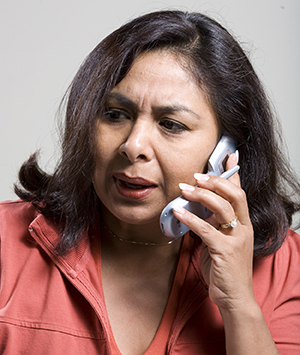Domestic Abuse: Changing Your Life
Abuse tends to get worse and occur more often over time. If you are being abused, plan ahead to get out for good. But don’t feel discouraged if it takes more than 1 try. It often does. With courage and help from others, you can change your life.

Increase your safety now
You don’t deserve to be abused. Prepare now to protect your health and safety:
-
Reach out for help. Contact a women’s shelter for help with making your plans. Ask them what types of legal protections are available to you.
-
Have an emergency exit. Know how to get out of your home in a hurry. Find a back door or window that you can leave through.
-
Make a plan. Decide where to go in an emergency. Learn how to get there without a car and make age-appropriate arrangements for your children.
-
Signal for help. If you trust a neighbor, set up an emergency signal, such as a crooked window blind. Ask the neighbor to call the police if they see this sign.
-
If you think you are in immediate danger, you are. You are the best judge of your situation. Leave immediately for a safe location or call the police if you are able. When the police arrive, ask what legal protections you have. Don’t let the police leave you alone with the abuser. If you have been injured, ask for medical help. Make sure the medical staff record your injuries as being caused by an assault, not falling down the stairs or running into a door.
How to start
Leaving an abuser can be dangerous. Often the safest time to leave is soon after your abuser has made up with you. But you are the best judge of when to leave. Trust your instincts and get ready. That way you can act quickly when the time is right. To get ready, do the following:
-
Pack an emergency bag. Include clothing, cash, car keys, any daily medicines, and important papers. These include birth certificates, passports, bank account numbers, and health insurance numbers. Have a trusted friend keep these items for you.
-
Find a safe place to live. A friend’s house or a women’s shelter may offer protection until you find a more permanent place.
-
Look into job training. Many women’s shelters provide job referrals and child-care services.
Get help
Domestic abuse is against the law. Find out what your rights are. Women’s and family shelters or hotlines can help you get started.
Remember that you are not alone. Look to friends, family, religious leaders, and counselors for support. Women’s shelters and social services can also help. Check online for resources in your area. Here are resources:
Online Medical Reviewer:
L Renee Watson MSN RN
Online Medical Reviewer:
Marianne Fraser MSN RN
Online Medical Reviewer:
Paul Ballas MD
Date Last Reviewed:
12/1/2022
© 2000-2024 The StayWell Company, LLC. All rights reserved. This information is not intended as a substitute for professional medical care. Always follow your healthcare professional's instructions.